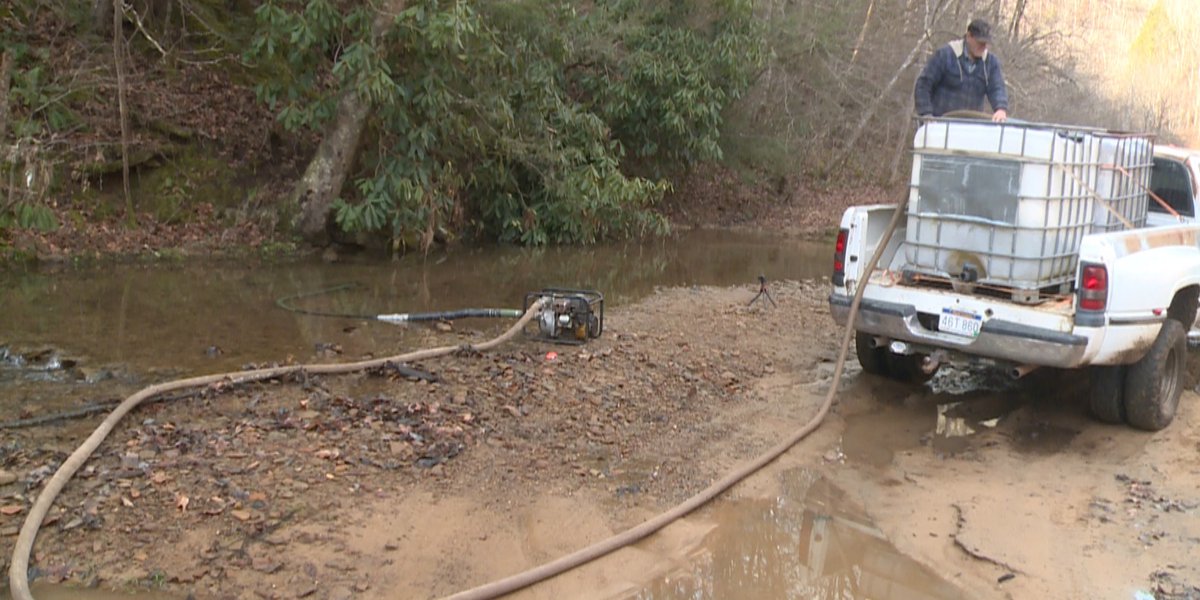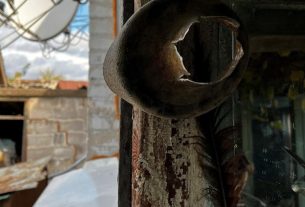MCDOWELL COUNTY, W.Va. (WSAZ) – Clean drinking water is a basic human right, but in McDowell County some people have not had access to clean water in decades.
“I feel like we’re left behind,” said Sonny Barton, a McDowell County resident who’s been without running water for more than 40 years. “They always promise, but getting it done is a different thing. They can always promise you something, but that doesn’t mean you’re going to get it.”
Barton’s house on Whitaker Ridge looks like many in rural Appalachia, but it’s missing running water.
“I’m not coming off this mountain unless they haul me off. This is my home. I ain’t going nowhere,” said Barton.
Water lines stop about three miles from Barton’s house, so getting water into his home is a long, grueling process he’s been doing for four decades.
“I’m looking at anywhere from 30 to 35 minutes for one haul or maybe a little more,” said Barton.
Every week, Barton loads up two 300 gallon tanks and water jugs in the back of his pickup truck and drives off the mountain to get water for his family.
“Drinking water comes from down the road, and then we get our other water out of the creek,” said Barton.
His first stop is for drinking water which comes from a spring out of an old coal mine 300 feet up a hill.
“You don’t have to treat it. It tastes just as good as the water that comes out of the bottle,” said Barton.
To get water the family uses for everything else, Barton pumps water out of the creek.
It’s a process Barton has down to a science, including putting a hose into the creek and using a gas-powered pump to get the water into his tanks.
It takes about 10 minutes for the tanks to fill and then Barton heads back to his house to unload.
Barton empties the tanks into a cistern he built at his home.
“It holds 3,300 gallons. I don’t let it go dry except in summer time when we clean it out,” said Barton.
He treats the water with bleach to kill any bacteria such as e-coli.
Barton also has a pressure tank that sends water to the house.
“We have a hot water heater.. You name it, we have it all,” said Barton.
This process is something Barton does three or four times in one day and he’s not sure how much longer he’ll physically be able to do it.
“That’s up to the good Lord above, not me. I will haul it until I can’t no more if that’s what it takes,” he said.
In December, Michael Regan, the Administrator of the United States Environmental Protection Agency came to McDowell County to discuss the decades-long water struggles facing residents like Barton.
“It’s actually enlightening to me to see the level of resilience and optimism. The people of McDowell County haven’t given up,” said Regan.
One solution locals are working on are hydro-panels located at Five Loaves Two Fishes Food Bank.
They are powered by solar panels and they pull moisture from the air and into water tanks.
The panels are a part of a pilot program to see if this process could work in rural Appalachia.
“They’ll produce enough drinking water for these folks if we mount them on their roof tops,” said Bob McKinney of the non-profit Dig Deep. “This would be a solution for someone like Sonny.”
These panels are still in the development stage and they are trying to overcome challenges with weather and maintenance before the panels can go to individual families.
“No one in McDowell County or West Virginia is looking for a handout. They’re looking for an opportunity to demonstrate they have the solutions on the ground,” said Regan.
As for long-term solutions such as new infrastructure, Regan says federal funding is on the way.
West Virginia is receiving $83 million from the Bipartisan Infrastructure Law. That money will be solely for water projects across the state.
“We’ve begun talking about how to create competitive applications for those resources. It’s my understanding that McDowell County has two to three projects at the top tier of qualification for that $83 million,” said Regan. “Finally, McDowell County should be seeing within this year access to some of those resources to solve some of these problems that have been here for decades.”
The EPA and West Virginia Department of Environmental Protection tell WSAZ, $1.5 million from the Bipartisan Infrastructure Law will go to the Iaeger project. The design for the project is almost complete and is ranked number one on the Clean Water and Drinking Water State Revolving Funds (CWSRF) Intended Use Plan.
That project will provide service to approximately 118 potential customers (295 persons).
The total cost for the Iaeger project is $7.9 million. The remaining funds are being provided by the Federal Community Development Block Grant program, the State Infrastructure and Jobs Development Council, the Appalachian Regional Commission, and the U.S. Department of Agriculture. The WVDEP’s Abandoned Mine Lands Economic Revitalization (AMLER) program is also providing $1 million in funding for the Iaeger project.
The WVDEP says the Iaeger project is the only wastewater infrastructure project being funded by the Bipartisan Infrastructure Law in McDowell County.
They say there are projects in the City of Gary and the Town of Davy that are currently in the early stages of the funding process, but it has not been determined whether these projects will be funded through the Bipartisan Infrastructure Law or the CWSRF’s base funding stream.
According to the WVDEP, the following projects are in the works in McDowell County:
The CWSRF is co-funding a sewer upgrade project with the WVDEP’s AMLER program for the Town of Bradshaw in McDowell County. The design for this project is complete. The CWSRF is providing $800,000 and the AMLER program is providing $1.5 million in funding.
The total cost for the Bradshaw project is $6.2 million.
The WVDEP’s AMLER program is also providing partial funding for a sewer project in the Ashland/Crumpler area in McDowell County.
Once the design phase is complete and all necessary approvals from the funding agencies and other appropriate entities have been received for a specific project, the project will go out to bid.
The Coalwood project is approximately 75 percent complete. The majority of the infrastructure is in place. However, supply-chain issues have delayed the remaining equipment.
This project is constructing a new collection system and packaging plant for 60 customers along Route 16 in Coalwood.
The McDowell County PSD says there are currently no projects in the works to get water to Barton’s home.
Officials with the PSD say funding agencies look at the cost per person for projects, and it would cost too much to run lines up the mountain to Barton’s house and they do not have those resources.
Copyright 2023 WSAZ. All rights reserved.



